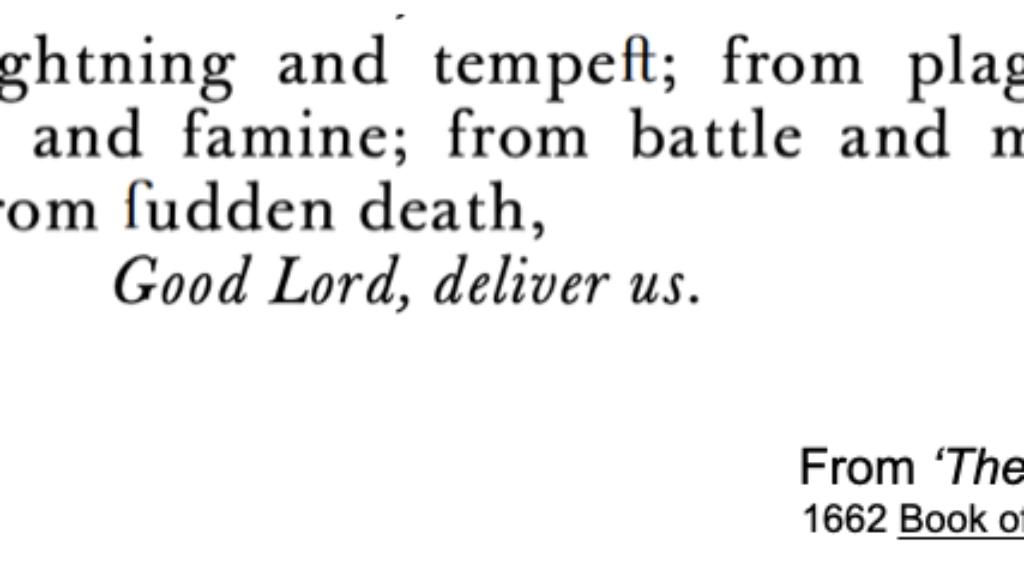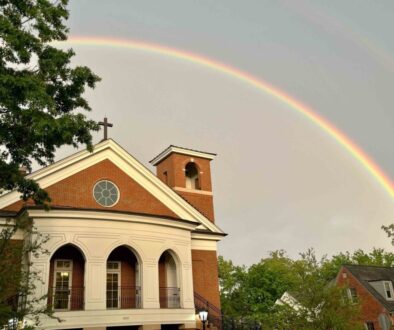Good Lord Deliver Us

Friends,
I am reproducing the reflection I shared at the beginning of morning prayer last Sunday, March 29. Many of you have asked about the prayer of deprecation. Thank you for your interest!
-David
29 March 2020
Good morning! This week, a friend sent me a reflection from a university president who, like all of us, in this season of coronavirus, is trying to make sense of what is happening and what God is doing in the midst of it.
Interestingly he began by reflecting on a section of The 1662 Book of Common Prayer’s Great Litany.
You may recall that in 1665, over a quarter of the population of London had died because of the Great Plague. And in 1666, the Great Fire of London destroyed a third of the city and left over 100,000 people homeless- in just 5 days. It was catastrophe upon catastophe. In the midst of that kind of heartache, Archbishop Thomas Cranmer’s prayer- the litany- would have been so apropos.
“From lightning and tempest; from plague, pestilence, and famine; from battle and murder; and from sudden death…”
Good Lord, deliver us.
Here is the reflection of Alexander Whitaker, president of King University in Bristol, TN
A deprecation, such as that above, is a prayer to be spared from disaster. The Latin root means to repel or avoid physical calamity by prayer. We rarely hear the word deprecation in this 16th– and 17th-century sense anymore.
We rarely pray words like these and if we did, they would probably land far from our most heart-felt concerns… especially before March 2020.
Whitaker goes on to say,
“Many of those things Archbishop Cranmer lists do not particularly frighten us or cause us to seek protection, from God or otherwise—at least not in any regular fashion. Many of the things that once were routine exposures to death, to mortality, are now militated against by experience, by medicine, by technology, or by engineering.
Indeed, the very notion of being “safe” has been so defined downward (at least on many university campuses) it often now for many has little to do with physical safety and preservation, and instead is used to describe protection from unfamiliar ideas, less-than-pleasant words, or trifling inconveniences. As profoundly silly as that may be, we should probably be thankful that undergraduates have been fretting over pronouns instead of polio. Such are the blessings of this age that rarely does one have to worry continually about one’s death or that of one’s family and friends. But eventually danger comes to us all, without exception—as does death.
And yet, there is hope.
If one believes in God’s providence there is revealed in these circumstances God’s calling us: to return to him apace, to trust him wholly, and to do his work resolutely.
Our uncertainty draws us to the certainty of our Sovereign and Holy God.
Our fears cause us to seek God’s peace and protection.
Our deep desire that we and others be spared pain rightly prompts our deprecation—one that God desires.
So that is what we gather today to do: TOGETHER.
To return to God, to trust Him wholly, and to do the work He has called us to do, resolutely.
We gather together for the strength of community- to see faces we love, to see the prayers of others, to know we are not alone.
“Grace to you and peace from God our Father and the Lord Jesus Christ…” [Philippians 1:2]

